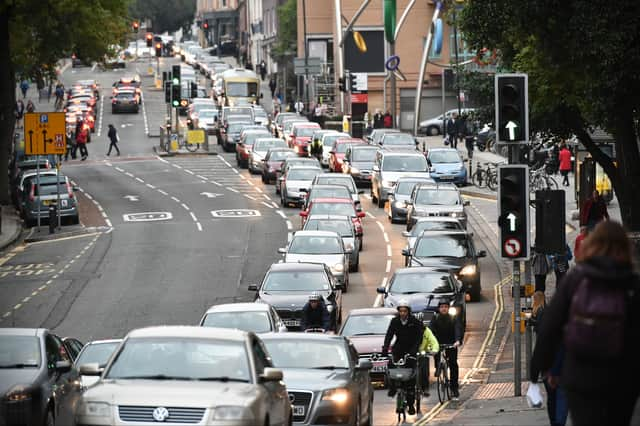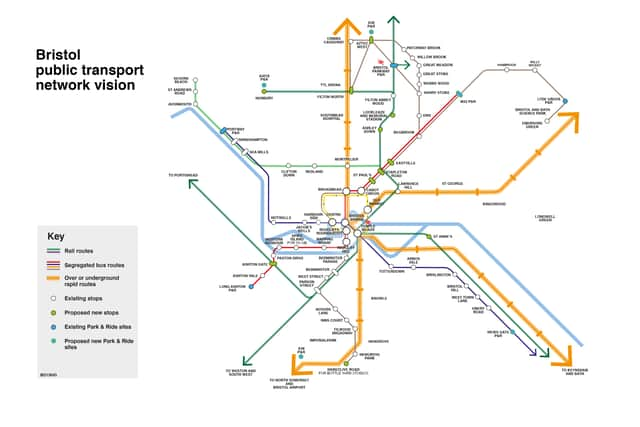‘That’s why we need a mass transit system’ - Bristol named as the third most congested city in the UK


For anyone who travels in their car on the Bath Road or M32 into Bristol each day, this will not shock you.
Bristol has been named the UK’s third most congested city by traffic data company INRIX.
Advertisement
Hide AdAdvertisement
Hide AdDespite having a population of fewer than 500,000 people, the average driver in the city spends more time in queues than in Birmingham or Manchester, according to a travel report by the company.
The data also shows that, despite congestion dropping when the country was in lockdown last year, queues are returning to city roads as people appear to be using their cars again.
It is a blow for environmental groups in the city which hoped commuters and shoppers would take up public transport as offices and shops reopened this year.
INRIX said the average driver will spend an estimated 66 hours behind the wheel in traffic in Bristol this year, losing £578 as a result.
Advertisement
Hide AdAdvertisement
Hide AdJust London and Cambridge saw motorists wait longer in congestion.
How did we get to this?
Go back to before the Second World War and the city had an extensive tram system linking most of the areas of the city. There were 17 routes in total, but these began to close when operations were damaged during the war, with the final service in 1941.
Despite the demise of the trams, the city still did have a good railway network linking many inter-city stations.
But again, lines were closed as part of Dr Beeching cuts in the late 1960s. The Midland Railway, now the Bristol and Bath Railway Path, was among the victims.
Advertisement
Hide AdAdvertisement
Hide AdIt has left a growing population depending on the remaining train services, buses and, of course, cars - unless people cycle, walk or run.
Asked about congestion at his recent press conference, Mayor Marvin Rees said: “The problems we have today with congestion are not things that developed five years ago - these are a product of 50 years of a failure to plan Bristol.
“They are coming to fruition today, and they have been compounded by covid.”
Why are people returning to their cars
Compared to the estimated 66 hours people will have lost in traffic in Bristol this year, last year motorists spent 37 hours in queues.
Advertisement
Hide AdAdvertisement
Hide AdThis increase this year, Inrix say, is down to people returning to the roads after months of remote and hybrid working in 2020.
Shops have also reopened for people to drive to city centres for again.
Gus Hoyt, who was assistant mayor under George Ferguson and is a Green Party member, said in Bristol ‘the car has been allowed to rule supreme’.
He said despite the city being green, it was also known for its personal freedoms.
Advertisement
Hide AdAdvertisement
Hide AdHe said: “People’s addiction to their cars and their belief that car ownership is separate to the problems of congestion, air pollution and pavement parking only makes matters worse.”
Green councillor Heather Mack said the issue lay with the current transport system.
She said: “I think our transport infrastructure has been neglected. We haven’t been prioritising sustainable transport options.
“The clear air zone initiative has been delayed several times. We need faster action on these problems.”
Advertisement
Hide AdAdvertisement
Hide AdWhat is causing the congestion?
Self-employed courier Marc Archibald blamed new traffic restrictions for the congestion in Bristol.
He claimed the bus gate at Bristol Bridge and partial closure of Baldwin Street means he has to do an extra 3.4 miles each week.
He also cited the city’s cycle lanes as part of the problem.
He said: “It seems to be the agenda in Bristol to hate cars - they’re closing down the city.”
Advertisement
Hide AdAdvertisement
Hide AdHe added that if bus prices were cheaper, and the services more reliable, then more people would use them.
What is the solution?
Mayor Marvin Rees gave a solution - a mass transit system.
The scheme would include major bus and rail upgrades as well as a underground and overground network.
There would also be segregated rapid bus routes and new railway stations as part of the scheme, which could take up to 15 years to build.
A £1.5 million investment was made into exploring the idea earlier this year.
Advertisement
Hide AdAdvertisement
Hide Ad

Asked about congestion in the city, Mr Rees said: “That’s why we need a mass transit system, and that’s why we’ve been pushing for a mass transit system and going through the process.
“A mass transit system would offer the basis of that chapter of change for public transport that we need.
“Because that congestion is happening in a city of 465,000 people today, we’re going to be 550,000 by 2050 so we’ve got to get it in place.”
Other measures being taken, said Mr Rees were bus prioritisation routes in the city, including the bus gate on Bristol Bridge, partial closure of Baldwin Street and plans to improve the speed of the number 2 bus route through the city.
Advertisement
Hide AdAdvertisement
Hide AdHe added: “So we are making those interventions across the city to help peoples movement on to public transport.”
He also said it was important new housing was located on brownfields areas within walking and cycling distance of people’s ‘needs’.
What do you think the solution is to congestion problems in Bristol? Email [email protected]
Comment Guidelines
National World encourages reader discussion on our stories. User feedback, insights and back-and-forth exchanges add a rich layer of context to reporting. Please review our Community Guidelines before commenting.